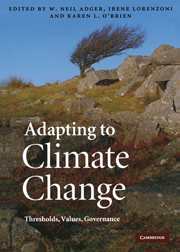Book contents
- Frontmatter
- Contents
- List of contributors
- Preface
- 1 Adaptation now
- Part I Adapting to thresholds in physical and ecological systems
- Part II The role of values and culture in adaptation
- 9 The past, the present and some possible futures of adaptation
- 10 Do values subjectively define the limits to climate change adaptation?
- 11 Conceptual and practical barriers to adaptation: vulnerability and responses to heat waves in the UK
- 12 Values and cost–benefit analysis: economic efficiency criteria in adaptation
- 13 Hidden costs and disparate uncertainties: trade-offs in approaches to climate policy
- 14 Community-based adaptation and culture in theory and practice
- 15 Exploring the invisibility of local knowledge in decision-making: the Boscastle Harbour flood disaster
- 16 Adaptation and conflict within fisheries: insights for living with climate change
- 17 Exploring cultural dimensions of adaptation to climate change
- 18 Adapting to an uncertain climate on the Great Plains: testing hypotheses on historical populations
- 19 Climate change and adaptive human migration: lessons from rural North America
- Part III Governance, knowledge and technologies for adaptation
- 31 Conclusions: Transforming the world
- Index
- References
10 - Do values subjectively define the limits to climate change adaptation?
Published online by Cambridge University Press: 31 August 2009
- Frontmatter
- Contents
- List of contributors
- Preface
- 1 Adaptation now
- Part I Adapting to thresholds in physical and ecological systems
- Part II The role of values and culture in adaptation
- 9 The past, the present and some possible futures of adaptation
- 10 Do values subjectively define the limits to climate change adaptation?
- 11 Conceptual and practical barriers to adaptation: vulnerability and responses to heat waves in the UK
- 12 Values and cost–benefit analysis: economic efficiency criteria in adaptation
- 13 Hidden costs and disparate uncertainties: trade-offs in approaches to climate policy
- 14 Community-based adaptation and culture in theory and practice
- 15 Exploring the invisibility of local knowledge in decision-making: the Boscastle Harbour flood disaster
- 16 Adaptation and conflict within fisheries: insights for living with climate change
- 17 Exploring cultural dimensions of adaptation to climate change
- 18 Adapting to an uncertain climate on the Great Plains: testing hypotheses on historical populations
- 19 Climate change and adaptive human migration: lessons from rural North America
- Part III Governance, knowledge and technologies for adaptation
- 31 Conclusions: Transforming the world
- Index
- References
Summary
Introduction
Climate change adaptation is increasingly seen as both a necessary and urgent response to a changing climate, and much research is being undertaken to identify barriers and constraints to successful adaptation. Most discussions focus on limited adaptive capacity as a constraint to adaptation to climate change, and emphasise technological, financial and institutional barriers (Grothmann and Patt, 2005; Yohe and Tol, 2002). It is presumed that once these external barriers are removed or overcome, society will be able to successfully adapt to a changing climate. It has, however, also been suggested that adaptation to climate change may be limited by the irreversible loss of places and identities that people value (Adger et al., 2009a, 2009b). Adger et al. (2009b) argue that social and individual characteristics may likewise act as deep-seated barriers to adaptation. Such perspectives raise important questions about the role that individual and societal values play in adapting to climate change: is adaptation a successful strategy for maintaining what is valued? How do adaptation measures taken by some affect the values of others? In the case of value conflicts, whose values count?
Values are, in effect, an interior and subjective dimension of adaptation. In contrast to systems and behaviours that can be objectively measured and observed, values subjectively influence the adaptations that are considered desirable and thus prioritised.
- Type
- Chapter
- Information
- Adapting to Climate ChangeThresholds, Values, Governance, pp. 164 - 180Publisher: Cambridge University PressPrint publication year: 2009
References
- 74
- Cited by

